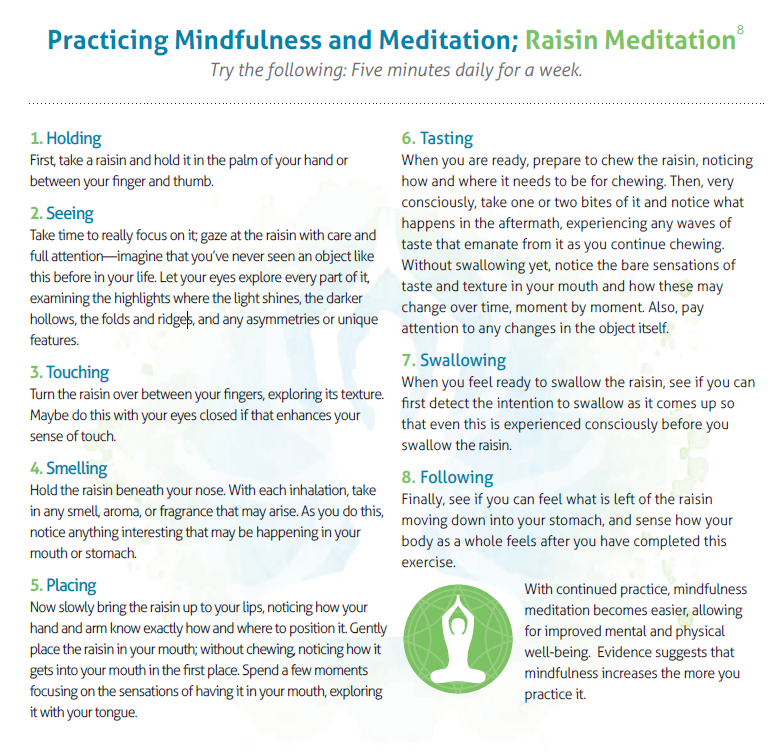Mindfulness: Meditation and Everyday Practice

“Mindfulness is the content of one’s thoughts, feelings, images, memories, and consciousness itself. It is the psychological training in self-culture, self-improvement and self-help.”
- Dr Jon Kabat-Zinn, Professor University of Massachusetts Medical School
Mindfulness is the maintaining of moment-by-moment consciousness of our thoughts, feelings, bodily sensations, and our relationship and interaction with the surrounding environment. It is the practice of being intentional, accepting, and non-judgmental while focusing one’s attention on the emotions, thoughts, and sensations occurring in the present moment.(1)
Daily practice of mindfulness has been shown to improve both mental and physical states, including, memory, sense of self, empathy, and it reduces stress, anxiety, addiction, pain, psoriasis, and blood pressure.(2)(3)
Every person can benefit from mindfulness meditation, as all of us can use time during our day to reflect and be present.
We often don’t do this enough and are fixated on what is to come, versus enjoying or acknowledging the moment. Those who are stressed, feel anxiety, are struggling to concentrate in work and life, or just need to ease their mind and body can benefit from daily practice of mindfulness meditation.
Benefits of Mindfulness Meditation
The ancient Buddhist religion has been mastering mindfulness meditation for the past 2,500 years.Until recently, mindfulness meditation hasn’t been widely practiced or studied by the general public forits medical benefits. With increased popularity in mindfulness meditation, scientists have been able to study the differences in individuals who practice mindfulness versus those who do not. Scientists have been intrigued by the wide range of mental and physical effects mindfulness practices has on an individual’s mind and body.(4)
Here are some of the benefits of mindfulness meditation:
- Reduced fear. MRI results have shown after eight weeks of mindfulness practice that the brain’s “fight or flight” centre, the amygdala, appears to shrink. This primal region of the brain is associated with fear, stress, and emotional response. As the amygdala shrinks, the pre-frontal cortex, associated with higher order brain functions such as awareness, concentration, and decision-making becomes thicker. The result, weaker functional connectivity between the amygdala and the brain, causing the connections between areas associated with attention and concentration to become stronger. In other words, our primal responses to fear and stress are superseded by more thoughtful and higher functioning brain responses.(5)
- Reduced pain. Researchers have found that those who practice mindfulness meditation report feeling less pain than those who are non-practicing. Although brain scans of individuals practicing mindfulness have shown more activity in the areas of the brain associated with pain, the cingulate cortex (associated with the unpleasantness of pain), results suggest that the cingulate cortex and the prefrontal cortex (associated with moderating social behaviour) appear to become uncoupled in those using mediation. The uncoupling of these two cortex’s, which normally communicate with one another, allows those who are frequent meditators to block the experience and refrain from engaging in the thought process of pain.(6)
- Reduced stress. Research has shown the focusing on the present rather than letting the mind drift may help to lower levels of cortisol, the stress hormone. High levels of cortisol, a hormone produced by the adrenal gland, are associated with physical and emotional stress. Prolonged release of this hormone contributes to a wide-range of adverse effects on a number of physiological systems (i.e. decreased immune system etc.). Through continued practice of mindfulness meditation, studies have shown reductions in cortisol levels, leading to increased physical and mental health benefits (i.e. lowered blood pressure, less anxiety or stress, etc.).(7)
Mindfulness meditation has many benefits beyond the above mentioned. Five minutes of daily practice can help focus one's mind and prepare for the challenges ahead.
If you are interested in practicing mindfulness meditation, try the exercise below or go online for additional resources. There are many free resources available to learn mindfulness meditation.

Sources:
- Berkeley University. “Mindfulness | Definition.” Greater Good, greatergood.berkeley.edu/mindfulness/definition. Accessed 24 Aug. 2017.
- Michael Forrester. “What Happens to Your Brain When You Practice Mindfulness.” Waking Times, 26 July 2016, www.wakingtimes.com/2016/07/25/what-happens-to-your-brain-mindfulness/. Accessed 24 Aug. 2017.
- A Randomized Controlled Trial on Effects of the Transcendental Meditation Program on Blood Pressure, Psychological Distress, and Coping in Young Adults. Sanford I. Nidich1, Maxwell V. Rainforth1, David A.F. Haaga2, John Hagelin3, John W. Salerno1, Fred Travis4, Melissa Tanner2, Carolyn Gaylord-King1, Sarina Grosswald3 and Robert H. Schneider1
- Ireland, Tom. “What Does Mindfulness Meditation Do to Your Brain?” Scientific American Blog Network, June 2014, blogs.scientificamerican.com/guest-blog/what-does-mindfulness-meditation-do-to-your-brain/. Accessed 24 Aug. 2017.
- Taren AA, Creswell JD, Gianaros PJ (2013) Dispositional Mindfulness Co-Varies with Smaller Amygdala and Caudate Volumes in Community Adults. PLoS ONE 8(5): e64574. https://doi.org/10.1371/journal.pone.0064574
- Mindfulness meditation-related pain relief: Evidence for unique brain mechanisms in the regulation of pain. Neuroscience Letters, Volume 520, Issue 2, 29 June 2012, Pages 165-173 F. Zeidan, J.A. Grant, , C.A. Brown, J.G. McHaffie, , R.C. Coghill
- Andy Fell. “Mindfulness from meditation associated with lower stress hormone.” UC Davis, 23 Jan. 2016, www.ucdavis.edu/news/mindfulness-meditation-associated-lower-stress-hormone. Accessed 15 Aug. 2017.
- “Eating One Raisin: A First Taste of Mindfulness.” Extension Service, West Virginia University. Adapted from: Williams, M., Teasdale, J., Segal, Z., & Kabat-Zinn, J. (2007). The Mindful Way through Depression: Freeing Yourself from Chronic Unhappiness. New York: Guilford Press.




